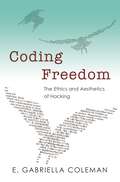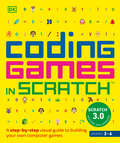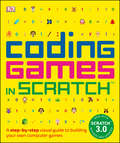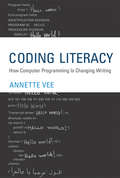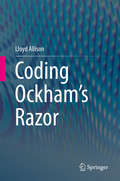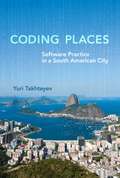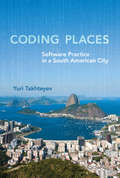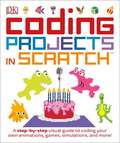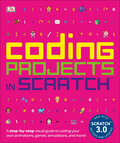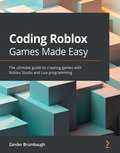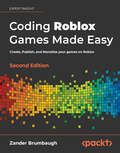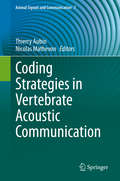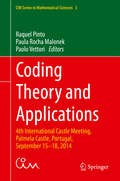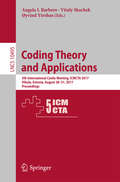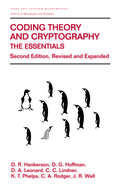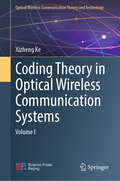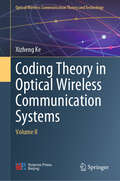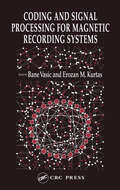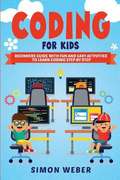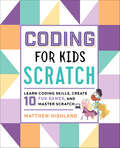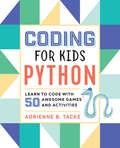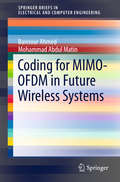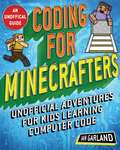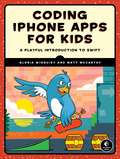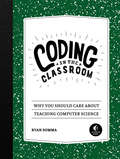- Table View
- List View
Coding Freedom: The Ethics and Aesthetics of Hacking
by E. Gabriella ColemanWho are computer hackers? What is free software? And what does the emergence of a community dedicated to the production of free and open source software--and to hacking as a technical, aesthetic, and moral project--reveal about the values of contemporary liberalism? Exploring the rise and political significance of the free and open source software (F/OSS) movement in the United States and Europe, Coding Freedom details the ethics behind hackers' devotion to F/OSS, the social codes that guide its production, and the political struggles through which hackers question the scope and direction of copyright and patent law. In telling the story of the F/OSS movement, the book unfolds a broader narrative involving computing, the politics of access, and intellectual property. E. Gabriella Coleman tracks the ways in which hackers collaborate and examines passionate manifestos, hacker humor, free software project governance, and festive hacker conferences. Looking at the ways that hackers sustain their productive freedom, Coleman shows that these activists, driven by a commitment to their work, reformulate key ideals including free speech, transparency, and meritocracy, and refuse restrictive intellectual protections. Coleman demonstrates how hacking, so often marginalized or misunderstood, sheds light on the continuing relevance of liberalism in online collaboration.
Coding Games in Scratch
by Carol VordermanIf you like playing computer games, why not make your own? This book has all you need to build amazing games, including thrilling racing challenges, zany platform games, and fiendish puzzles.Follow the simple steps to become an expert coder, using the popular programming language Scratch™ 3.0. This updated edition is the first to be tablet-computer friendly, making it even easier to get coding.Improve your coding skills and create your own games, before remixing and customizing them. Jumpy Monkey will show you how to simulate gravity in your games, or give Dog's Dinner a try to learn about collision detection.Pick up the fundamentals of computer programming in steps that make even the most difficult coding concepts fun and easy to understand. Don't just learn how computer code works—understand why it's done that way.Then share your games online and challenge friends and family to beat each other's scores. Once you've whizzed through the book, the possibilities are endless!
Coding Games in Scratch: A Step-by-Step Visual Guide to Building Your Own Computer Games (DK Help Your Kids)
by Jon WoodcockScratch 3.0 has landed! Stay ahead of the curve with this fully updated guide for beginner coders.Coding is not only a highly sought-after skill in our digital world, but it also teaches kids valuable skills for life after school. This book teaches important strategies for solving problems, designing projects, and communicating ideas, all while creating games to play with their friends.Children will enjoy the step-by-step visual approach that makes even the most difficult coding concepts easy to master. They will discover the fundamentals of computer programming and learn to code through a blend of coding theory and the practical task of building computer games themselves. The reason coding theory is taught through practical tasks is so that young programmers don't just learn how computer code works - they learn why it's done that way. With Coding Games in Scratch, kids can build single and multiplayer platform games, create puzzles and memory games, race through mazes, add animation, and more. It also supports STEM education initiatives and the maker movement.Follow Simple Steps – Improve Your Skills – Share Your Games!If you like playing computer games, why not create your own? Essential coding concepts are explained using eight build-along game projects. Coding Games In Scratch guides young coders step-by-step, using visual samples, easy-to-follow instructions, and fun pixel art. This coding book for kids has everything you need to build amazing Scratch 3.0 games, including thrilling racing challenges, zany platform games, and fiendish puzzles. Follow the simple steps to become an expert coder using the latest version of the popular programming language Scratch 3.0 in this new edition. Improve your coding skills and create your own games before remixing and customizing them. Share your games online and challenge friends and family to beat each other's scores! In this book, you will: - Learn about setting the scene, what makes a good game and playability- Discover objects, rules, and goals- Explore hacks and tweaks, camera angles, fine-tuning and controls- And much moreComputer coding teaches kids how to think creatively, work collaboratively, and reason systematically, and is quickly becoming a necessary and sought-after skill. DK's computer coding books for kids are full of fun exercises with step-by-step guidance, making them the perfect introductory tools for building vital skills in computer programming. Add Coding Projects in Scratch and Coding Projects in Python to your collection.
Coding Literacy: How Computer Programming Is Changing Writing (Software Studies)
by Annette VeeHow the theoretical tools of literacy help us understand programming in its historical, social and conceptual contexts.The message from educators, the tech community, and even politicians is clear: everyone should learn to code. To emphasize the universality and importance of computer programming, promoters of coding for everyone often invoke the concept of “literacy,” drawing parallels between reading and writing code and reading and writing text. In this book, Annette Vee examines the coding-as-literacy analogy and argues that it can be an apt rhetorical frame. The theoretical tools of literacy help us understand programming beyond a technical level, and in its historical, social, and conceptual contexts. Viewing programming from the perspective of literacy and literacy from the perspective of programming, she argues, shifts our understandings of both. Computer programming becomes part of an array of communication skills important in everyday life, and literacy, augmented by programming, becomes more capacious.Vee examines the ways that programming is linked with literacy in coding literacy campaigns, considering the ideologies that accompany this coupling, and she looks at how both writing and programming encode and distribute information. She explores historical parallels between writing and programming, using the evolution of mass textual literacy to shed light on the trajectory of code from military and government infrastructure to large-scale businesses to personal use. Writing and coding were institutionalized, domesticated, and then established as a basis for literacy. Just as societies demonstrated a “literate mentality” regardless of the literate status of individuals, Vee argues, a “computational mentality” is now emerging even though coding is still a specialized skill.
Coding Ockham's Razor
by Lloyd AllisonThis book explores inductive inference using the minimum message length (MML) principle, a Bayesian method which is a realisation of Ockham's Razor based on information theory. Accompanied by a library of software, the book can assist an applications programmer, student or researcher in the fields of data analysis and machine learning to write computer programs based upon this principle. MML inference has been around for 50 years and yet only one highly technical book has been written about the subject. The majority of research in the field has been backed by specialised one-off programs but this book includes a library of general MML–based software, in Java. The Java source code is available under the GNU GPL open-source license. The software library is documented using Javadoc which produces extensive cross referenced HTML manual pages. Every probability distribution and statistical model that is described in the book is implemented and documented in the software library. The library may contain a component that directly solves a reader's inference problem, or contain components that can be put together to solve the problem, or provide a standard interface under which a new component can be written to solve the problem. This book will be of interest to application developers in the fields of machine learning and statistics as well as academics, postdocs, programmers and data scientists. It could also be used by third year or fourth year undergraduate or postgraduate students.
Coding Places
by Yuri TakhteyevSoftware development would seem to be a quintessential example of today's Internet-enabled "knowledge work"--a global profession not bound by the constraints of geography. In Coding Places, Yuri Takhteyev looks at the work of software developers who inhabit two contexts: a geographical area--in this case, greater Rio de Janeiro--and a "world of practice," a global system of activities linked by shared meanings and joint practice. The work of the Brazilian developers, Takhteyev discovers, reveals a paradox of the world of software: it is both diffuse and sharply centralized. The world of software revolves around a handful of places--in particular, the San Francisco Bay area--that exercise substantial control over both the material and cultural elements of software production. Takhteyev shows how in this context Brazilian software developers work to find their place in the world of software and to bring its benefits to their city. Takhteyev's study closely examines Lua, an open source programming language developed in Rio but used in such internationally popular products as World of Warcraft and Angry Birds. He shows that Lua had to be separated from its local origins on the periphery in order to achieve success abroad. The developers, Portuguese speakers, used English in much of their work on Lua. By bringing to light the work that peripheral practitioners must do to give software its seeming universality, Takhteyev offers a revealing perspective on the not-so-flat world of globalization.
Coding Places: Software Practice in a South American City (Acting with Technology)
by Yuri TakhteyevAn examination of software practice in Brazil that reveals both the globalization and the localization of software development.Software development would seem to be a quintessential example of today's Internet-enabled “knowledge work”—a global profession not bound by the constraints of geography. In Coding Places, Yuri Takhteyev looks at the work of software developers who inhabit two contexts: a geographical area—in this case, greater Rio de Janeiro—and a “world of practice,” a global system of activities linked by shared meanings and joint practice. The work of the Brazilian developers, Takhteyev discovers, reveals a paradox of the world of software: it is both diffuse and sharply centralized. The world of software revolves around a handful of places—in particular, the San Francisco Bay area—that exercise substantial control over both the material and cultural elements of software production. Takhteyev shows how in this context Brazilian software developers work to find their place in the world of software and to bring its benefits to their city.Takhteyev's study closely examines Lua, an open source programming language developed in Rio but used in such internationally popular products as World of Warcraft and Angry Birds. He shows that Lua had to be separated from its local origins on the periphery in order to achieve success abroad. The developers, Portuguese speakers, used English in much of their work on Lua. By bringing to light the work that peripheral practitioners must do to give software its seeming universality, Takhteyev offers a revealing perspective on the not-so-flat world of globalization.
Coding Projects In Scratch
by Dorling Kindersley Publishing Staff Jon WoodcockA straightforward, visual guide that shows young learners how to build their own computer projects using Scratch, a popular free programming language, using fun graphics and easy-to-follow instructions. <p><p> Kids can animate their favorite characters, build games to play with friends, create silly sound effects, and more with Coding Projects in Scratch. All they need is a desktop or laptop with Adobe 10.2 or later, and an internet connection to download Scratch 2.0. Coding can be done without download on https://scratch.mit.edu. <p> Step-by-step instructions teach essential coding basics and outline 18 fun and exciting projects, including a personalized birthday card; a "tunnel of doom" multiplayer game; a dinosaur dance party animation with flashing lights, music, and dance moves--and much more. <p> The simple, logical steps in Coding Projects in Scratch are fully illustrated with fun pixel art and build on the basics of coding, so that kids can have the skills to make whatever kind of project they can dream up. <p> Supporting STEM education initiatives, computer coding teaches kids how to think creatively, work collaboratively, and reason systematically, and is quickly becoming a necessary and sought-after skill. DK's computer coding books are full of fun exercises with step-by-step guidance, making them the perfect introductory tools for building vital skills in computer programming.
Coding Projects in Scratch: A Step-by-Step Visual Guide to Coding Your Own Animations, Games, Simulations, a (DK Help Your Kids)
by Jon WoodcockA perfect introduction to coding for young minds! This updated step-by-step visual guide teaches children to create their own projects using Scratch 3.0.Suitable for complete beginners, this educational book for kids gives readers a solid understanding of programming. Teach them to create their own projects from scratch, preparing them for more complex programming languages like Python.Techy kids will familiarize themselves with Scratch 3.0 using this beginner's guide to scratch coding. Difficult coding concepts become fun and easy to understand, as budding programmers build their own projects using the latest release of the world's most popular programming language for beginners.Make a Dino Dance Party or create your own electronic birthday cards for friends and family. Build games, simulations, and mind-bending graphics as you discover the awesome things computer programmers can do with Scratch 3.0. This second edition of Coding Projects in Scratch uses a visual step-by-step approach to split complicated code into manageable, easy-to-digest chunks. Even the most impressive projects become possible. This book is an impressive guide that is perfect for anyone who wants to learn to code. Follow Simple Steps, Improve Your Skills & Share Your Creations!Follow the simple steps to become an expert coder using the latest version of the popular programming language Scratch 3.0 in this new edition. Create mind-bending illusions, crazy animations, and interactive artwork with this amazing collection of Scratch projects. Suitable for beginners and experts alike, this fabulous introduction to programming for kids has everything you need to learn how to code. You'll improve your coding skills and learn to create and customize your own projects, then you can share your games online and challenge friends and family to beat each other's scores! What's inside this kids' coding book? - Simulations, mind-benders, music, and sounds- Algorithms, virtual snow, and interactive features- Different devices, operating systems, programming languages and moreComputer coding teaches kids how to think creatively, work collaboratively, and reason systematically, and is quickly becoming a necessary and sought-after skill. DK's computer coding books for kids are full of fun exercises with step-by-step guidance, making them the perfect introductory tools for building vital skills in computer programming. Coding Projects in Scratch is one of three brilliant coding books for kids. Add Coding Games in Scratch and Coding Projects in Python to your collection.
Coding Roblox Games Made Easy: The ultimate guide to creating games with Roblox Studio and Lua programming
by Zander BrumbaughGet up and running with Roblox development with the help of expert guidance for working with Roblox components and Lua programmingKey FeaturesDiscover solutions to common problems faced while creating games on RobloxExplore tips, tricks, and best practices and learn advanced Roblox coding techniques to create gamesUnderstand how to program in the Roblox Lua language, add engaging effects, add a variety of functionalities, and much moreBook DescriptionRoblox is a global virtual platform like no other for both playing and creating games. With well over 150 million monthly active users, Roblox hosts all genres of games that can be played by other members of the community using the Lua programming language. Not only can you create games for free, but you can also earn considerable sums of money if from the success of your games, and become part of the vast and supportive developer circle that provides excellent opportunities for networking in a tight-knit community. With this practical book, you'll get hands-on experience working on the Roblox platform. You'll start with an overview of Roblox development and then understand how to use Roblox Studio. As you progress, you'll gradually learn everything you need from how to program in Roblox Lua to creating Obby and Battle Royale games. Finally, you'll delve into the logistics of game production, focusing on optimizing the performance of your game by implementing impressive mechanics, monetization, and marketing practices. By the end of this Roblox book, you'll be able to lead or work with a team to bring your gaming world to life, and extend that experience to players around the world.What you will learnGet started with Roblox development and explore aspects such as choosing a developer typeUnderstand how to use Roblox Studio and other free resourcesCreate your first game with the Roblox Lua programming languageBecome well-versed with the three Ms - Mechanics, Monetization, and MarketingDevelop real-world games such as Battle Royale and ObbyDiscover expert tips for collaborating effectively and managing project workloadsWho this book is forThis Roblox guide is for anyone interested in learning how to develop games on the Roblox platform. If you're already familiar with Roblox and looking for tips, tricks, and Roblox and Lua best practices for efficient development, you'll find this book helpful.
Coding Roblox Games Made Easy: The ultimate guide to creating games with Roblox Studio and Luau programming, 2nd Edition
by Zander BrumbaughGet up and running with Roblox environment and Luau programming basics to build and share your gamesIncludes an exclusive invite to join the online Roblox game development communityKey FeaturesBegin coding in Luau: build player avatars, battlefields, game physics, countdown timers and moreLearn tips, tricks, best practices, and advanced Roblox coding techniques to create 3D gamesJoin the book club to discuss queries, provide solutions, and ask Zander for advice on your gamesBook DescriptionRoblox is a huge entertainment platform like no other for both playing and creating games. With over 200 million monthly active users, Roblox has enabled new and experienced developers to create successful games, often called experiences, that can be played globally at no cost.Coding Roblox Games Made Easy, 2nd Edition, builds a solid foundation of the concepts you need to embark on the journey of building two end-to-end games in Roblox in increasing order of complexity.For the first game, you will create obstacles and traps for an obstacle course game (obby) and overcome them to win the game alongside other players and earn rewards. In the next game, you will manage player avatars, their weapons, a battlefield and add programming logic for the players to find their weapons and fight, with a reward for the last player standing.Finally, you'll delve into the logistics of game production, focusing on optimizing your games' performance by implementing impressive mechanics, monetization, and marketing practices. We will also discuss how the Metaverse is set to change the dynamics of user experience and what the future holds for Roblox game developers.Let's create and share experiences through play!What you will learnUnderstand how to use Roblox Studio and other free resourcesLearn how to code in Luau: basics, game systems, physics manipulation, etc.Test, evaluate, and redesign to create bug-free and engaging gamesUse Roblox programming and rewards to make your first gameMove from a lobby to a battleground, build avatars and create weapons with which to fightMaster the three Ms: Mechanics, Monetization, MarketingLearn 50 cool things to do on RobloxWho this book is forGet started with building your first game on the Roblox platform. This book is for anyone interested in learning the fundamentals of Luau programming and Roblox Studio and needs direction to build and share games. If you're already familiar with Roblox and are looking for tips, tricks, and the best Roblox and Luau practices for efficient development, you'll find this book helpful.The book requires no prior knowledge of game development.
Coding Strategies in Vertebrate Acoustic Communication (Animal Signals and Communication #7)
by Thierry Aubin Nicolas MathevonInformation is a core concept in animal communication: individuals routinely produce, acquire, process and store information, which provides the basis for their social life. This book focuses on how animal acoustic signals code information and how this coding can be shaped by various environmental and social constraints. Taking birds and mammals, including humans, as models, the authors explore such topics as communication strategies for “public” and “private” signaling, static and dynamic signaling, the diversity of coded information and the way information is decoded by the receiver. The book appeals to a wide audience, ranging from bioacousticians, ethologists and ecologists to evolutionary biologists. Intended for students and researchers alike, it promotes the idea that Shannon and Weaver’s Mathematical Theory of Communication still represents a strong framework for understanding all aspects of the communication process, including its dynamic dimensions.
Coding Theory and Applications: 4th International Castle Meeting, Palmela Castle, Portugal, September 15-18, 2014 (CIM Series in Mathematical Sciences #3)
by Raquel Pinto Paula Rocha Malonek Paolo VettoriThe topics covered in this book, written by researchers at the forefront of their field, represent some of the most relevant research areas in modern coding theory: codes and combinatorial structures, algebraic geometric codes, group codes, quantum codes, convolutional codes, network coding and cryptography. The book includes a survey paper on the interconnections of coding theory with constrained systems, written by an invited speaker, as well as 37 cutting-edge research communications presented at the 4th International Castle Meeting on Coding Theory and Applications (4ICMCTA), held at the Castle of Palmela in September 2014. The event's scientific program consisted of four invited talks and 39 regular talks by authors from 24 different countries. This conference provided an ideal opportunity for communicating new results, exchanging ideas, strengthening international cooperation, and introducing young researchers into the coding theory community.
Coding Theory and Applications: 5th International Castle Meeting, ICMCTA 2017, Vihula, Estonia, August 28-31, 2017, Proceedings (Lecture Notes in Computer Science #10495)
by Ángela I. Barbero, Vitaly Skachek and Øyvind YtrehusThis book constitutes the refereed proceedings of the 5th International Castle Meeting on Coding Theory and Applications, ICMCTA 2017, held in Vihula, Estonia, in August 2017.The 24 full papers presented were carefully reviewed and selected for inclusion in this volume. The papers cover relevant research areas in modern coding theory, including codes and combinatorial structures, algebraic geometric codes, group codes, convolutional codes, network coding, other applications to communications, and applications of coding theory in cryptography.
Coding Theory and Cryptography: The Essentials, Second Edition (Chapman & Hall/CRC Pure and Applied Mathematics)
by Charles C. Lindner Gary Hoffman D.C. Hankerson D.A. Leonard K.T. Phelps C.A. Rodger J.R. WallContaining data on number theory, encryption schemes, and cyclic codes, this highly successful textbook, proven by the authors in a popular two-quarter course, presents coding theory, construction, encoding, and decoding of specific code families in an "easy-to-use" manner appropriate for students with only a basic background in mathematics offerin
Coding Theory in Optical Wireless Communication Systems: Volume I (Optical Wireless Communication Theory and Technology)
by Xizheng KeThis book focuses on optical-wireless communication systems. It summarizes the author's optical-wireless communication coding work while carrying out pertinent scientific research programs. The primary topics covered in the book are channel coding, coding modulation, error control (channel coding), and channel equalization. The author's mathematical analysis and experimental studies on the key theoretical issues are discussed in the book. One of the book's outstanding aspects is its thorough and methodical discussion of practical optical-wireless communication challenges. This makes the book especially appealing to readers who are eager to learn about applicable solutions in this area. Researchers, engineers, and graduate students in the subject of telecommunications can all profit from the book. It is appropriate for senior undergraduates, lecturers at colleges and universities, graduate students, and engineering and technical workers involved in optical communication.
Coding Theory in Optical Wireless Communication Systems: Volume II (Optical Wireless Communication Theory and Technology)
by Xizheng KeThis book focuses on optical-wireless communication systems. It summarizes the author's optical-wireless communication coding work while carrying out pertinent scientific research programs. The primary topics covered in the book are channel coding, coding modulation, error control (channel coding), and channel equalization. The author's mathematical analysis and experimental studies on the key theoretical issues are discussed in the book. One of the book's outstanding aspects is its thorough and methodical discussion of practical optical-wireless communication challenges. This makes the book especially appealing to readers who are eager to learn about applicable solutions in this area. Researchers, engineers, and graduate students in the subject of telecommunications can all profit from the book. It is appropriate for senior undergraduates, lecturers at colleges and universities, graduate students, and engineering and technical workers involved in optical communication.
Coding and Signal Processing for Magnetic Recording Systems (Computer Engineering Series)
by BaneVasic Erozan M. KurtasImplementing new architectures and designs for the magnetic recording read channel have been pushed to the limits of modern integrated circuit manufacturing technology. This book reviews advanced coding and signal processing techniques and architectures for magnetic recording systems. Beginning with the basic principles, it examines read/write operations, data organization, head positioning, sensing, timing recovery, data detection, and error correction. It also provides an in-depth treatment of all recording channel subsystems inside a read channel and hard disk drive controller. The final section reviews new trends in coding, particularly emerging codes for recording channels.
Coding for Kids: Beginners Guide With Fun And Easy Activities To Learn Coding Step By Step
by Simon WeberThis book is intended for children who wish to learn programming and computing. In this day and age, computer knowledge, or literacy, if we may call it that, is of huge importance for every person, from early childhood on through to his or her adult, professional lives. Even in the preschool system, children very often have tasks given to them by their teachers, which require the use of computers to a certain extent. That is precisely the reason this book would be of good use both for teachers and for children. Teachers will get help on the topic of how to bring the computer closer to children, and children get the opportunity to learn their first basic knowledge of computers and their use. They also get their first clues on the benefits computers can bring to them and their lives.
Coding for Kids: Learn Coding Skills, Create 10 Fun Games, and Master Scratch
by Matthew HighlandLearn to code awesome games with Scratch—a fun starter guide for kids 6 to 10Explore basic coding concepts and skills and start creating your own games right away! Coding for Kids: Scratch is a complete guide that makes mastering the Scratch programming language fun and easy for kids.From sprites and code blocks to scripts and scorekeeping, Coding for Kids: Scratch helps you discover everything you need to know to create 10 amazing games that you and your friends can play. Watch your confidence grow with step-by-step instructions and clear directions that keep things simple—even as the games you're making get more challenging. Game on!Coding for Kids: Scratch includes:Coding for kids—Learn Scratch terms and concepts, then use them to build games you can start playing immediately.Create 10 games—Cake Clicker, Dino Hunt, Crystal Keeper, and more—code, play, and share 10 cool games.Master Scratch—Simple directions, full-color screenshots, and projects that get more difficult make practicing Scratch a breeze.Make coding for kids fun and games with Coding for Kids: Scratch.
Coding for Kids: Learn to Code with 50 Awesome Games and Activities
by Adrienne B. TackeGames and activities that teach kids ages 10+ to code with Python Learning to code isn't as hard as it sounds—you just have to get started! Coding for Kids: Python starts kids off right with 50 fun, interactive activities that teach them the basics of the Python programming language. From learning the essential building blocks of programming to creating their very own games, kids will progress through unique lessons packed with helpful examples—and a little silliness! Kids will follow along by starting to code (and debug their code) step by step, seeing the results of their coding in real time. Activities at the end of each chapter help test their new knowledge by combining multiple concepts. For young programmers who really want to show off their creativity, there are extra tricky challenges to tackle after each chapter. All kids need to get started is a computer and this book. This beginner's guide to Python for kids includes: 50 Innovative exercises—Coding concepts come to life with game-based exercises for creating code blocks, drawing pictures using a prewritten module, and more. Easy-to-follow guidance—New coders will be supported by thorough instructions, sample code, and explanations of new programming terms. Engaging visual lessons—Colorful illustrations and screenshots for reference help capture kids' interest and keep lessons clear and simple. Encourage kids to think independently and have fun learning an amazing new skill with this coding book for kids.
Coding for MIMO-OFDM in Future Wireless Systems (SpringerBriefs in Electrical and Computer Engineering)
by Bannour Ahmed Mohammad Abdul MatinThis book introduces the reader to the MIMO-OFDM system, in Rayleigh frequency selective-channels. Orthogonal frequency division multiplexing (OFDM) has been adopted in the wireless local-area network standards IEEE 802. 11a due to its high spectral efficiency and ability to deal with frequency selective fading. The combination of OFDM with spectral efficient multiple antenna techniques makes the OFDM a good candidate to overcome the frequency selective problems.
Coding for Minecrafters: Unofficial Adventures for Kids Learning Computer Code
by Ian GarlandLearn to Code while Adventuring through the Overworld!This fun and educational activity book Introduces kids to the world of coding through the Minecraft world they love. Colorfully illustrated characters and themes from their favorite video game bring the excitement of coding to life, while easy-to-follow screenshots guide them through activities. With adventures that include design, music, animation, gaming, and more, learners will discover tons of ways coding connects to other activities they love and how far a little imagination and invention can take them…to The End and beyond! Minecrafting-themed characters help kids become master coders Kid-friendly concepts and steps designed specifically for ages 8-12 Great games, mods, experiments, and more teach computational thinking—how to tackle large problems by breaking them down into a sequence of smaller, more manageable problems Whether brand-new to coding or looking for more hands-on learning, Coding for Minecrafters helps young coders advance in technology education by leaps and bounds—and have fun doing it!
Coding iPhone Apps for Kids: A Playful Introduction To Swift
by Matt Mccarthy Gloria WinquistApple’s Swift is a powerful, beginner-friendly programming language that anyone can use to make cool apps for the iPhone or iPad. In Coding iPhone Apps for Kids, you’ll learn how to use Swift to write programs, even if you’ve never programmed before.You’ll work in the Xcode playground, an interactive environment where you can play with your code and see the results of your work immediately! You’ll learn the fundamentals of programming too, like how to store data in arrays, use conditional statements to make decisions, and create functions to organize your code—all with the help of clear and patient explanations.Once you master the basics, you’ll build a birthday tracker app so that you won’t forget anyone’s birthday and a platform game called Schoolhouse Skateboarder with animation, jumps, and more!As you begin your programming adventure, you’ll learn how to:–Build programs to save you time, like one that invites all of your friends to a party with just the click of a button!–Program a number-guessing game with loops to make the computer keep guessing until it gets the right answer–Make a real, playable game with graphics and sound effects using SpriteKit–Challenge players by speeding up your game and adding a high-score systemWhy should serious adults have all the fun? Coding iPhone Apps for Kids is your ticket to the exciting world of computer programming.Covers Swift 3.x and Xcode 8.x. Requires OS X 10.11 or higher.
Coding in the Classroom: Why You Should Care About Teaching Computer Science
by Ryan SommaA book for anyone teaching computer science, from elementary school teachers and coding club coaches to parents looking for some guidance.Computer science opens more doors for today's youth than any other discipline - which is why Coding in the Classroom is your key to unlocking students' future potential. Author Ryan Somma untangles the current state of CS education standards; describes the cognitive, academic, and professional benefits of learning CS; and provides numerous strategies to promote computational thinking and get kids coding! Whether you're a teacher, an after-school coach, or a parent seeking accessible ways to boost your kid's computer savvy, Coding in the Classroom is here to help. With quick-start programming strategies, scaffolded exercises for every grade level, and ideas for designing CS events that promote student achievement, this book is a rock-solid roadmap to CS integration from a wide variety of on-ramps. You'll learn: • tips and resources for teaching programming concepts via in-class activities and games, without a computer • development environments that make coding and sharing web apps a breeze • lesson plans for the software lifecycle process and techniques for facilitating long-term projects • ways to craft interdisciplinary units that bridge CS and computational thinking with other content areas Coding in the Classroom does more than make CS less formidable - it makes it more fun! From learning computational thinking via board games to building their own websites, students are offered a variety of entry points for acquiring the skills they need to succeed in the 21st-century workforce. Moreover, Somma understands how schools operate - and he's got your back. You'll be empowered to advocate for the value of implementing CS across the curriculum, get stakeholder buy-in, and build the supportive, equitable coding community that your school deserves.
